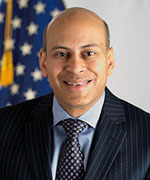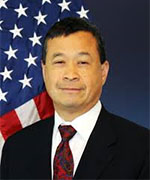Office of Research & Development |
 |
View: Recent Awards || All Awards
The VA Office of Research and Development has appointed five new members to the National Research Advisory Council (NRAC). The council was established in 1999 to help guide VA research. The council members serve as subject matter experts and advisors to the Secretary of Veterans Affairs and the Under Secretary of Health for the Veterans Health Administration.
The newly appointed members to the 2020 NRAC are:

Matt Kuntz, J.D.
Matt Kuntz, J.D., received his bachelor’s degree from West Point and his law degree from the University of Oregon. He served as in infantry officer in the U.S. Army and was recognized as a distinguished member of the 35th Infantry Regiment for his service. Kuntz was practicing corporate law when his stepbrother, a Montana National Guardsman who had post-traumatic stress disorder, committed suicide. Spurred on by his stepbrother’s death, Kuntz began advocating for effective screening and treatment of PTSD in returning service members. He is currently executive director of the National Alliance on Mental Illness in Montana. The organization provides support, education, and advocacy for Montanans coping with serious mental illness. Kuntz has helped to lead the charge on a number of successful state advocacy efforts such as establishing mental health peer services; developing children's mental health crisis beds; and preventing the incarceration of offenders with serious mental illness.

Paula Schnurr, Ph.D
Paula Schnurr, Ph.D., is executive director of VA’s National Center for Posttraumatic Stress Disorder. She is a professor of psychiatry at the Geisel School of Medicine at Dartmouth College, and editor of the Clinician's Trauma Update-Online. Schnurr is past president of the International Society for Traumatic Stress Studies and a fellow of the American Psychological Association and Association for Psychological Science. She has won numerous awards for her research and contributions to the field of traumatic stress studies. Schnurr is an expert on psychotherapy research and has conducted a number of clinical trials on treatment for PTSD, including three large multisite trials funded by the VA Cooperative Studies Program. Her most current research awards are a cooperative study to compare the effectiveness of prolonged exposure and cognitive processing therapy, and a study to validate a tool for PTSD screening in primary care.

Ronald K. Poropatich, M.D.
Ronald K. Poropatich, M.D., is the director of the Center for Military Medicine Research, Health Sciences, and professor of medicine in the division of pulmonary, allergy, and critical care medicine at the University of Pittsburgh. He is also professor of sports medicine and nutrition and an affiliated faculty member of the McGowan Institute for Regenerative Medicine at the University of Pittsburgh. Poropatich is an experienced pulmonary and critical care physician who served 30 years on active duty in the U.S. Army, retiring as a colonel. His final assignment was deputy director of the Telemedicine and Advanced Technology Research Center (TATRC), U.S. Army Medical Research and Materiel Command, at Fort Detrick, Maryland, from 2006-2012. Under his command, TATRC developed novel research programs and technologies in medical informatics and telemedicine.

Steven M. Dubinett, M.D.
Steven M. Dubinett, M.D., has served as a researcher and staff physician at the VA Greater Los Angeles Healthcare System since 1989. He has extensive experience in translational research, academic administration, mentorship, and peer review. Building on original discoveries concerning the role inflammation plays in the development of lung cancer, he has created a translational research program to bring new treatments to patients. Dubinett was principal investigator for the first VA Research Enhancement Award Program (REAP) in cancer gene medicine. He has also served in a variety of roles for the VA nationally, including chair of the oncology study section and member of the VA working group for peer review. Dubinett is also chief of the division of pulmonary and critical care medicine at UCLA. Since 2010, he has served as the senior associate dean for translational research in the David Geffen School of Medicine at UCLA and associate vice chancellor for research. He serves on many advisory boards, including those of LUNGevity and the Lung Cancer Foundation of America.

Sanjay Doddamani, M.D.
Sanjay Doddamani, M.D., is a senior advisor and medical officer with the Center for Medicare and Medicaid Innovation. He has designed, implemented, and led transformational change across large payer and health care platforms. Doddamani is experienced in designing value-based contracting models and understanding the infrastructure and culture required to position an organization for success. Previously, Doddamani was chief medical officer for "Geisinger at Home," a home-based care program targeted to frail or medically complex patients in Pennsylvania. He is board-certified in internal medicine, cardiovascular disease, and advanced heart failure/transplant cardiology. He completed a fellowship in cardiovascular disease at the University of Pennsylvania.

Geoffrey Ling, M.D.
Geoffrey Ling, M.D., is a continuing member of the NRAC and has been named council chair for 2020. He retired from the U.S. Army, at the rank of colonel, after serving 21 years on active duty. As a critical care physician, he was deployed to Afghanistan in 2003 and to Iraq in 2005. Ling completed four in-theater missions as a member of the Joint Chiefs of Staff "Gray Team" to assess traumatic brain injury (TBI) care in the combat theater. He is currently a professor of neurology at Johns Hopkins University and the Uniformed Services University of the Health Sciences. Ling is also an attending physician in the neurosciences critical care unit at Johns Hopkins Hospital and is the acting vice-chair for research in the department of clinical neurosciences at Inova Fairfax Hospital in Virginia. Ling was the founding director of the Biological Technologies Office at the Defense Advanced Research Projects Agency (DARPA). Ling was also a contributing author/editor for the VA-DoD Clinical Practice Guidelines for Mild Traumatic Brain Injury and Concussion.
The NRAC is governed by the VA Advisory Committee Management Office, which oversees 27 advisory committees. NRAC is one of 12 that were established at the direction of the VA secretary. Council members are appointed to a two-year term, with the option to be chosen for another two years. All members, including the NRAC chair, are nominated by ORD staff through a rigorous selection process. VA's chief research and development officer then nominates the candidates, whose names are sent to the VA secretary for final approval.